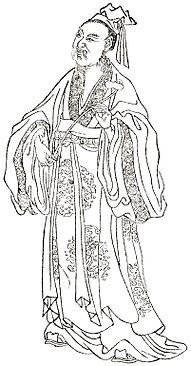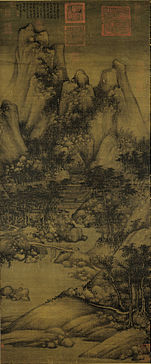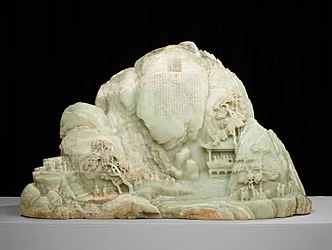Orchid Pavilion Gathering

The Orchid Pavilion Gathering of 353 CE, also known as the Lanting Gathering, was a cultural and poetic event during the Jin dynasty (266–420) of the Six Dynasties era, in China. This event itself has a certain inherent and poetic interest in regard to the development of landscape poetry and the philosophical ideas of Zhuangzi.[1] The gathering at the Orchid Pavilion is also famous for the artistry of the calligraphy of Wang Xizhi,[2] who was both one of the participants as well as the author and calligrapher of the Lantingji Xu (Preface to the Poems Composed at the Orchid Pavilion). Sun Chuo also wrote a preface, which is somewhat less famous.[3]
The Orchid Pavilion Gathering of 42 literati included
Modern influence
Aside from reproductions of the Lantingji Xu, other influences include the Orchid Pavilion Calligraphy College at Shaoxing University and Jay Chou's recording of a song by Vincent Fang entitled "Lántīng Xù" (蘭亭序, "Orchid Pavilion") from his album Capricorn.
Scroll copy of "Lantingji Xu"
Gallery
The events of the Orchid Pavilion Gathering and the ensuing poems have inspired not only generations of poets, but also painters and other artists.
-
Wang Xizhi (王羲之) was a Chinese calligrapher, traditionally referred to as the "Sage of Calligraphy" (書聖). This image was carried on the book which is called "Wan hsiao tang-Chu chuang-Hua chuan (晩笑堂竹莊畫傳)" which was published in 1921 (民国十年).
-
Main text of an early Tang Dynasty copy of Wang Xizhi's Lantingji Xu by Feng Chengsu (馮承素), located in the Palace Museum, Beijing. This is considered the best surviving copy.[5] Many copies in Chinese history were made from a lost original possibly buried in Emperor Taizong's mausoleum.
-
Juran – Xiao Getting the Orchid Pavilion Scroll by Deception.
-
Xiao Yi Trying to Swipe the Lanting Scroll, Song (960–1279) copy of a Tang original painting.
-
Jade Mountain Illustrating the Gathering of Scholars at the Lanting Pavilion, 1790 (Minneapolis Institute of Art)
See also
- Admonitions Scroll
- History of graphic design
- Juran (painter)
- Lantingji Xu
- Orchidaceae
- Shangsi Festival
- Six Dynasties poetry
- Xie An
- Zhejiang
References
Citations
- ^ Chang, 6
- ^ Wang Xizhi. Encyclopædia Britannica
- ^ Swartz, 278
- ^ Yip, 137
- ^ ISBN 0-06-010091-5.
Bibliography
- Chang, H. C. (1977). Chinese Literature 2: Nature Poetry. (New York: Columbia University Press). ISBN 0-231-04288-4
- Swartz, Wendy (2012) "Revisiting the Scene of the Party: A Study of the Lanting Collection", Journal of the American Oriental Society, 132.2 pp.275-300 (http://asianlanguages.rutgers.edu/images/stories/Faculty_Profile/facultydocs/swartz.lanting%20collection.pdf)
- Yip, Wai-lim (1997). Chinese Poetry: An Anthology of Major Modes and Genres . (Durham and London: Duke University Press). ISBN 0-8223-1946-2



![Main text of an early Tang Dynasty copy of Wang Xizhi's Lantingji Xu by Feng Chengsu (馮承素), located in the Palace Museum, Beijing. This is considered the best surviving copy.[5] Many copies in Chinese history were made from a lost original possibly buried in Emperor Taizong's mausoleum.](http://upload.wikimedia.org/wikipedia/commons/thumb/f/f1/LantingXu.jpg/333px-LantingXu.jpg)



